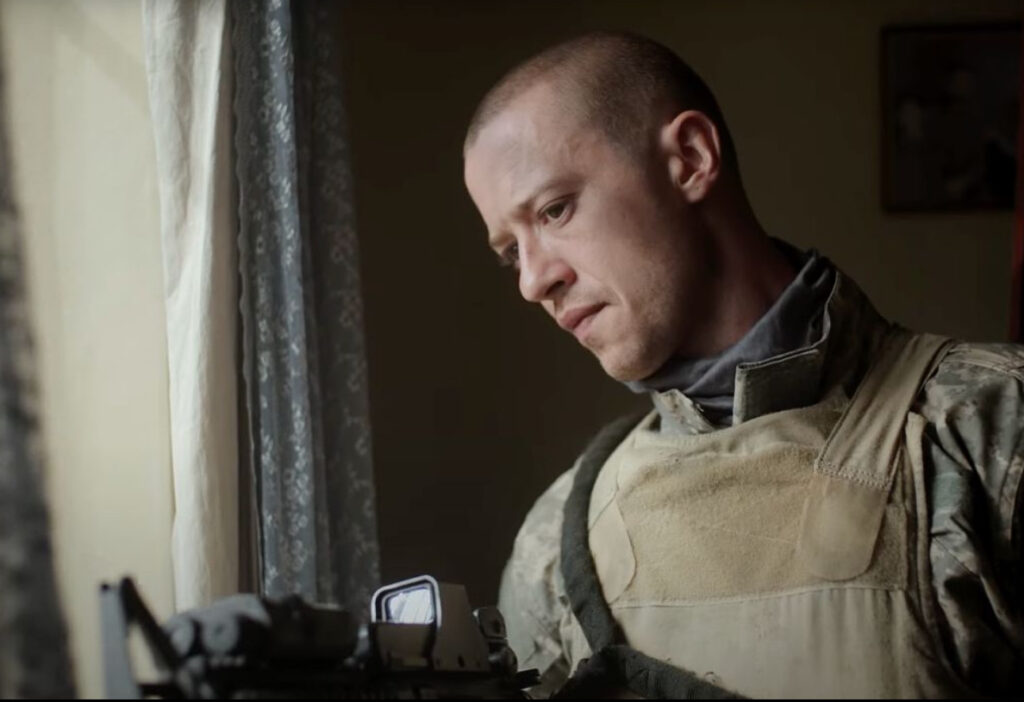In Warfare, the new film from Alex Garland and Ray Mendoza, the word brotherhood isn’t a slogan—it’s the pithy of the story. Not just in the script, not just on screen, but in the DNA of the production itself. Based on Mendoza’s own experience as a Navy SEAL during a high-stakes 2006 mission in Ramadi, Iraq, Warfare isn’t another war film built around explosions and tropes. It’s a raw, unfiltered look at what happens when men are thrown into hell and have only each other to hold onto.
Mendoza and Garland didn’t set out to make just another military thriller. They wanted to make something that felt true. True to the experience. True to the bond that forms in combat. True to the weight these men carry, both during the mission and long after it ends. And they brought together a cast ready to match that intensity—Kit Connor, Charles Melton, and Finn Bennett—young, sharp, hungry actors who didn’t just play soldiers. They became them.
Real Training, Real Brotherhood
Before cameras rolled, Garland and Mendoza put their cast through a brutal three-week boot camp designed to replicate the physical and mental pressure of SEAL training. It wasn’t just about learning to hold a rifle or move in formation. It was about breaking them down and building them back up—together.
Weapons drills. Tactical maneuvers. Endless physical endurance exercises. But also long hours with no distractions, no phones, no ego. Just a group of guys figuring out how to survive—just like the characters they’d be playing.
“It was such an odd group of guys because every single person in that cast could lead a movie,” said Kit Connor, who plays one of the younger SEALs. “But everyone put their egos at the door and decided, ‘I’m so happy to be here… I get to learn from all these other great actors.’”
That decision—to be present, humble, open—set the tone for everything that followed. By the time they stepped on set, they weren’t a group of actors anymore. They were a unit.
From Strangers to Brothers
The transformation wasn’t just physical. Off camera, the cast bonded fast and hard. Wrestling matches. Group workouts. Long conversations. Laughing until 2 a.m., then waking up at 5 to train. Shaving their heads together wasn’t just about looking the part—it was a shared ritual, a way of saying, “We’re all in.”
“It was a symbolic expression of ground zero,” Charles Melton said. “We’re in this together.”
Melton, who brings both strength and vulnerability to his role as a seasoned team leader, understood the importance of that unity. Without it, the film would have fallen flat. Because Warfare isn’t driven by plot—it’s driven by connection. The way the characters move together, react together, bleed together. That chemistry can’t be faked.
Finn Bennett was the wild card. Young, British, and new to this kind of environment, he worried about finding his place among a mostly American, mostly alpha group. But that anxiety didn’t last long.
“Within—I kid you not—hours, we were suddenly like little boys running around,” Bennett said. “We spent every second together. It was really beautiful.”
That mix of childlike joy and adult responsibility—of humor and horror—is part of what makes the film so emotionally complex. One minute the team is cracking jokes. The next, someone is bleeding out. That whiplash is real, Mendoza says. And it’s part of what makes the bond between soldiers so unbreakable. Because when death is always close, you don’t hold back.
Veterans on Set, Truth in Every Scene
To make sure they got it right, Mendoza brought in real veterans—including some who’d been part of the actual Ramadi mission. Their presence wasn’t for show. They were embedded in the production, advising on tactics, checking performances, making sure nothing rang false.
“There was a lot of responsibility and pressure there,” Mendoza admitted. “Because those are my friends. I’d rather represent them more accurately than represent myself.”
That level of commitment sets Warfare apart. This isn’t a film that sanitizes war or turns it into spectacle. There’s no slow-motion glory, no orchestral score swelling in the background. Just sharp, brutal realism. Gunfire, sweat, dust. The sickening lurch when something goes wrong. And the deep, quiet moments when one man reaches out to another—not because he has to, but because he knows that no one else in the world can understand what they’re going through.
The emotional cost is real. Not just for the characters, but for the audience. Watching Warfare means sitting with discomfort. It means seeing past the armor and into the eyes of men who are scared, exhausted, and still willing to go forward—because they won’t let each other down.
Redefining Masculinity
One of the most powerful things Warfare does is redefine what strength looks like. Yes, these men are tough. Yes, they’re trained killers. But they’re also vulnerable. They cry. They doubt. They hold each other when things fall apart. There’s no room here for toxic masculinity or stoic clichés. The film doesn’t just allow emotion—it demands it.
For Kit Connor, that was a revelation.
“We were playing people who had to carry so much trauma, and yet they find ways to stay human,” he said. “That balance was the hardest part. But it’s also what made the story worth telling.”
Melton agreed. “You realize quickly that being a man isn’t about how much you can carry alone. It’s about who you’re carrying it with.”
That theme resonates not just in the film’s dialogue, but in its silences. In a glance exchanged between teammates. In a hand on a shoulder. In a whispered joke during a firefight. These are the moments when the film breathes—when it pulls you in and refuses to let go.
Beyond the Battlefield
Warfare isn’t just about what happens in Iraq. It’s also about what follows these men home. PTSD. Survivor’s guilt. The challenge of reintegrating into a world that doesn’t—and can’t—understand what they’ve been through. While the Ramadi mission is the film’s centerpiece, it’s the emotional aftermath that lingers.
That’s where Garland’s hand is most visible. Known for cerebral, emotionally charged films like Ex Machina and Annihilation, Garland brings a lyrical, almost haunted quality to the storytelling. Flashbacks bleed into the present. Memories surface without warning. The past becomes a second battlefield.
Together, he and Mendoza create a layered, immersive experience. You’re not just watching these characters—you’re inside their heads. You feel the tension in their shoulders, the fatigue in their bones, the constant edge of fear. And when they find moments of peace—fleeting, fragile—you feel that too.
The Legacy of Warfare
In a landscape crowded with war films, Warfare stands alone. It’s not political. It’s not patriotic in the traditional sense. It doesn’t glorify violence or reduce soldiers to action figures. It’s a film about people—about what they give up, what they hold onto, and what they find in each other when everything else is gone.
It’s also a film about storytelling itself. About the responsibility of telling stories that matter. For Mendoza, this wasn’t just a creative project. It was personal.
“These are my friends,” he said again. “This isn’t history to me. This is memory.”
That urgency pulses through every frame. You feel it in the dust, the noise, the silences. You see it in the eyes of the cast—actors who, through boot camp, bonding, and brutal honesty, managed to tap into something real.
That’s the power of Warfare. Not its action, though the action is gripping. Not its cast, though the performances are stellar. What makes the film unforgettable is its heart. The deep, unshakeable belief that even in the worst circumstances, human connection can endure. That brotherhood isn’t just a buzzword. It’s a lifeline.
Impression
Warfare doesn’t ask you to cheer. It asks you to feel. It invites you into the lives of men who were forged in combat and bound by something deeper than duty. It strips away the glamour, the heroics, and leaves you with the raw truth: that brotherhood is not about uniform or rank. It’s about showing up—for each other, for yourself, for the story that deserves to be told.
No comments yet.









